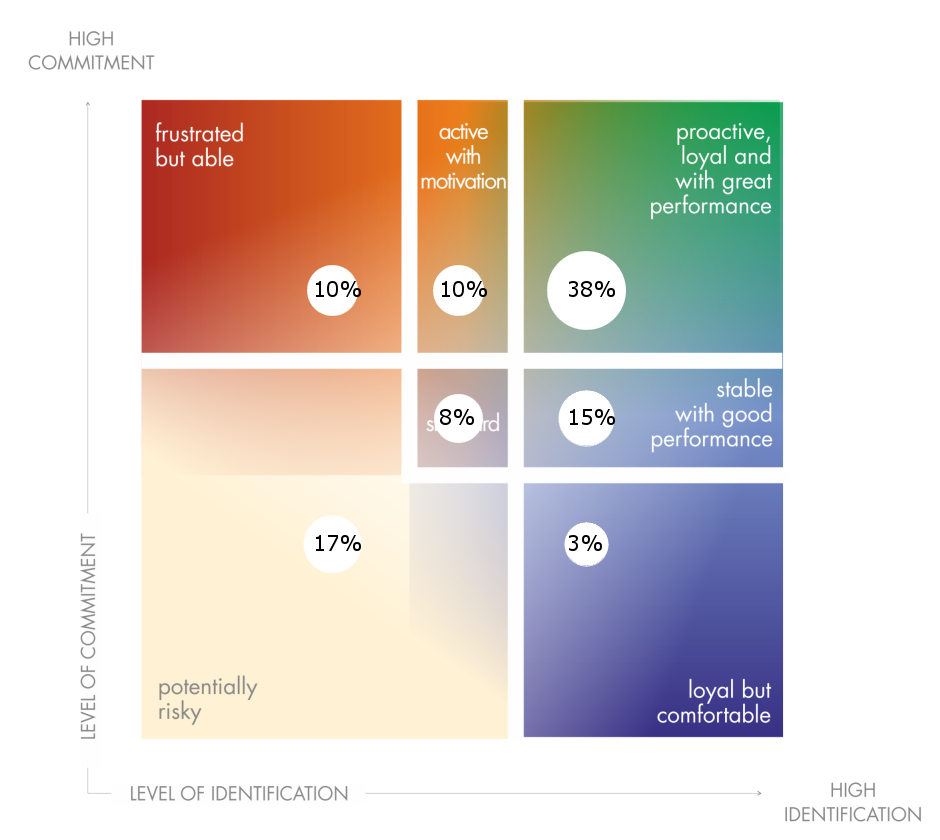Pavla Kaňková
+420 771 297 711
15. 02. 2023
What are employee surveys supposed to measure, and what does the data we get from them tell us? How has identification with the company changed in recent years, and what has the biggest impact on engagement? Marta Fabiánová, Executive Director of TCC online, answers these questions and more.
Based on more than 20 years of experience in the Czech market, we can say that clients are interested not only in how satisfied their employees are but also in how committed they are. In other words, how intrinsically motivated they are to do “something more”. They want to monitor identification or loyalty. One of the advantages of our solution is that it makes it easier to identify these things by tracking how important an issue is to employees.
Modern employee surveys offer a variety of formats and responses that should match the client’s exact needs. If reducing turnover is the main objective, the goal will be to find out what can strengthen people’s loyalty. If the company is facing significant changes, it will want to encourage people’s engagement and their willingness to engage in innovation in the first place. So, of course, it’s important to find out what will have the biggest impact on increasing engagement.
Do you want to map out the sub-topics and be able to react more flexibly to current events? Then only ask questions on your chosen topic, maybe a few times a year, and don’t wait for the “big” biennial survey. That’s great for benchmarks and long-term trends but may not be useful for mapping current employee perceptions of, let’s say, home office arrangements.
Which employees are the most loyal and engaged at the same time? Across multiple segments and years, we’ve noticed that it’s generally newcomers, i.e., employees who have been with the company for less than a year. Next, it tends to be the so-called “white collar” employees and managers. But make no mistake, newcomers are not automatically the youngest colleagues by age. On the contrary, we see in surveys that it is employees under 30 who show the lowest levels of identification and engagement. This may be due to generational differences in the expectations of younger workers, who often may not feel as tied to their employers and thus tend to be more open to different market offers. And the market, as we know, is currently rather hungry for labor.

Clients often ask us if anything has fundamentally changed since Covid, for example, whether employees are more loyal, more satisfied, and more appreciative of their work. We noticed a slight wobble in the data in 2020, with identification rates averaging 71%. The following year, it was already back to 75%, compared to 2019 (76%). We saw a dip in the identification rate in 2018, when it was at 60%. But overall, we can’t say that average employee loyalty has fallen significantly; on the contrary, it has remained relatively high.
In other respects, we could say that, from 2020 onwards, already apparent trends are being reinforced rather than reversed, or entirely new ones are emerging. Even in the last two years, the degree of influence of top management on the feeling of identification with the company, i.e., loyalty, has continued to increase by more than 20%. However, the highest increase over time is the need to express and exercise one’s opinion. This need has risen by more than 30% in the past two years and is significantly related to both identification and commitment.
Compared to pre-pandemic levels, the importance of information has also increased, as evidenced by the increased correlation between questions about knowing where to go for information and whether the information is understandable with overall levels of internal engagement. Anyone who’s been in charge of internal communications over the past two years knows precisely how crucial speed and clarity of information have been.
Our data confirms likely expectations. “Material” factors – specifically pay, benefits, and working conditions – significantly impact the desire to leave or stay. However, what the data reveals – contrary to general expectations – is that ‘soft’ factors are even more important, by more than 25% compared to material ones. Specifically, we’re talking about feelings of care, concern, fairness, and the opportunity to have a say and get involved.
The opportunity for long-term personal and professional growth and development is also proving to be an essential factor in motivating people to stay or leave. Another of the most decisive factors influencing people’s loyalty is leaders, and a trend that has grown stronger over the years is the importance of top management of specific personalities in companies’ leadership.
So, based on our data, we can say with confidence that the key factors for employees are:
These are the main things that either strongly motivate employees to stay or, on the contrary, persuade them to leave.
Our data, with a sample size of over 35,000 respondents, offers a compelling argument for all proponents of the view that company culture, leadership style, and how people are treated are disciplines that can be a significant competitive advantage and anchor for employees. HR practitioners often get pretty excited by the data, as they need facts and figures in addition to their expert opinion to convince management since decision-makers need data. And if we save vital resources by reducing turnover, training costs are transformed into investments in business development.
Many HR people deeply appreciate that the desire to stay, i.e., turnover, can be fundamentally influenced even during cuts and savings. Indeed, fairness, engaging employees in the solution, and a sense of concern and partnership need not cost a penny.
Are you interested in Employee Surveys more? Do you need advice on how to implement them in your company? Feel free to contact us at info@tcconline.eu.
Author: Marta Fabiánová, Managing Director of TCC online

29. 04. 2025
A great expert doesn’t automatically make a great leader. So, how can we reduce the risk of ruining a talented individual or a...
27. 03. 2025
Can you reliably identify great salespeople during the hiring process? What are the key traits and competencies that make a successful...